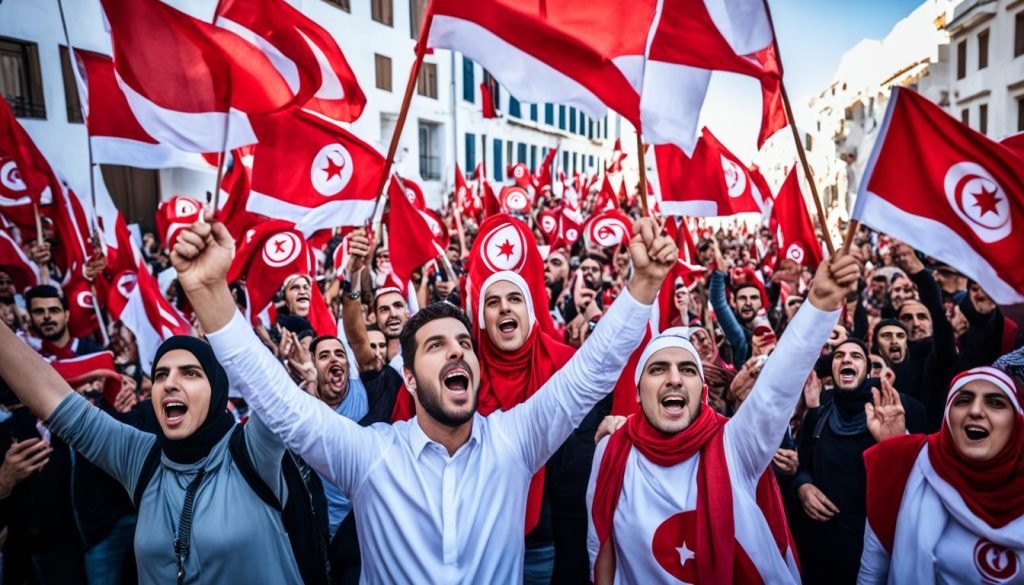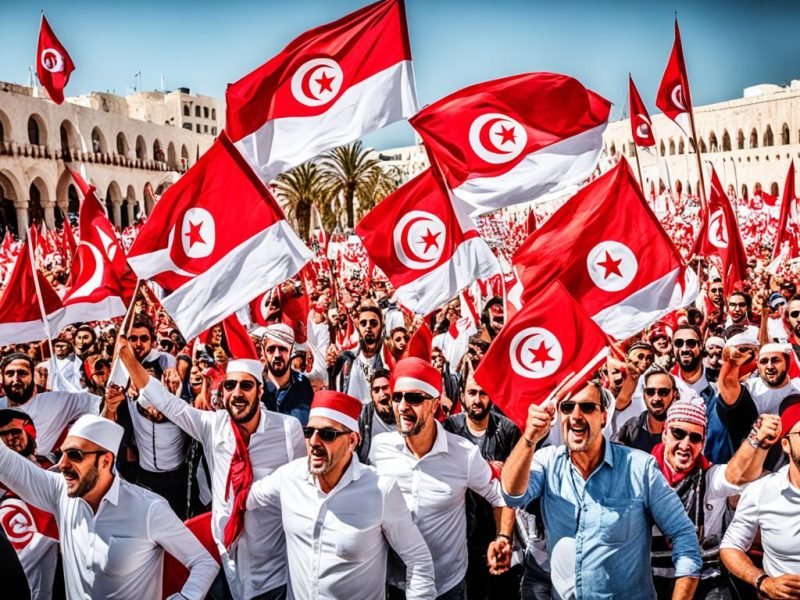Looking back at Tunisia’s journey to independence raises many questions. How did a small nation find success? They didn’t just fight; they unwound French control with careful plans. This was thanks to leaders like Habib Bourguiba and many brave hearts.
This fight wasn’t short or simple. It grew slowly under Bourguiba’s leadership, becoming a reality. The French saw they couldn’t win and chose to talk. This choice showed the strength of Tunisia’s desire for freedom.
In tracing this journey, the cleverness and strategy used stand out. It led to a peaceful new start for Tunisia with Bourguiba as Prime Minister. This peaceful change was unusual but showed a new way forward for many countries.
Key Takeaways
- The peaceful transition of power from French rule to Tunisian self-governance.
- Habib Bourguiba’s crucial role as the architect of Tunisia’s independence.
- The importance of negotiative strategy over violent conflict in achieving Tunisian independence.
- The significance of March 20, 1956, in Tunisian history as the day that symbolizes liberation.
- An understanding of the anti-colonial sentiment that fueled the Tunisian Liberation Movement.
- Insight into the decolonization process as part of the broader post-World War II geopolitical realignment.
The Roots of Tunisian Nationalism
Tunisian nationalism grew during the French Occupation. This time saw major political and social movements. These changes were part of Tunisia’s bigger fight for independence.
The Young Tunisian Movement and The Quest for Modernity
In 1907, the Young Tunisian Party began. They wanted modernization and more political freedom. They looked up to Europe for their government and society ideas.
They started ‘Le Tunisien’, a newspaper. It spread new ideas about change and fought against colonial rule.
The Formation of Destour Party and the Constitution of 1861
Founded in 1920, the Destour Party honored the 1861 Tunisian constitution. They wanted equal rights and a constitutional government. They stood against French rule, despite facing oppression.
Neo-Destour Emergence and Bourguiba’s Leadership
In 1934, the Neo-Destour Party emerged with Habib Bourguiba leading. This group renewed the fight for freedom. Bourguiba’s leadership united Tunisians against French control.
The Destour and Neo-Destour parties played key roles in Tunisia’s fight for freedom. With leaders like Bourguiba, they pushed towards independence. Their efforts reshaped Tunisia’s future and ignited national pride.
The Franco-Tunisian Power Struggle
The time when Tunisia’s national movements grew was key. They fought the French rulers, aiming for freedom. This clash paved Tunisia’s road to independence.
Destour’s Demands and French Repression
In the 1900s, Destour spoke for Tunisian freedom, asking for self-rule by 1920. France reacted harshly, arresting leaders. This showed how tough the fight against French rule in Tunisia was.
Rise in Political Tension and the Impact of World War II
World War II made things tense in Tunisia. The Vichy government’s rule caused trouble, including sending Tunisian leaders away. Yet, when these leaders came back during German control, hopes rose. This shows how World War II affected Tunisia’s independence fight.
Post-War Shifts and Tunisia’s Pursuit of Autonomy
World War II’s end changed North Africa’s politics. Tunisia got inspired by its neighbors’ push for independence. After the war, Tunisia moved strategically towards freedom. This led to Tunisia’s independence day, a win in their freedom fight.
The Strategic Shifts in French Colonial Policy
The world was changing during the French Occupation in Tunisia. People everywhere were calling for decolonization in Tunisia. France had to think differently about its control. It couldn’t just use force anymore. So, concessions by France began to seem like a good idea.
The rise of Tunisia Nationalism changed things too. It was part of a bigger wave of change worldwide. This made France rethink its approach and lean toward diplomacy. It was a move away from using military force.
French Concessions showed a big change in how France dealt with Tunisia. Talks between France and Tunisian leaders became key. They wanted to avoid global backlash and calm down unhappy people in Tunisia and other places. Making deals for some freedom marked a new strategy in French policy.
| Pre-Shift Policy | Post-Shift Strategy |
|---|---|
| Military Control and Repression | Negotiations and Autonomy Agreements |
| No Official Recognition of Nationalist Movements | Acknowledgment and Dialogue with Nationalist Leaders |
| Ignoring International Pressure | Responding to Global Decolonization Trends |
French policy changed a lot because of outside and inside pressures. French Concessions weren’t just quick fixes. They were careful plans to protect France’s interests. At the same time, they had to accept the growing demands for freedom and independence in the area.
How Did Tunisia Gain Independence?
In the mid-20th century, Tunisia found a way to freedom under Habib Bourguiba’s wise leadership. This move ended its time under French control. Both Tunisia’s strong freedom movement and pressure from other countries helped. They, along with France giving in on some points, made independence possible for Tunisia.
Bourguiba’s Incremental Independence Approach
Bourguiba led the Tunisian Nationalism movement, pushing for a smart, step-by-step plan for full freedom. He believed speaking carefully with the French could make a peaceful change in power. This approach made Tunisian freedom a real goal, not just a dream.
The Critical Role of Tunisia’s Liberation Movement
The Tunisian Revolution sped up the fight against colonial rule, getting a lot of support. People started to sabotage and protest more, showing strong resistance. This increase in action really pushed against the colonial powers and showed how important the movement was for Tunisia’s freedom.
International Influence and French Concessions
The world changed a lot after World War II, affecting Tunisia’s path to freedom. The fight for independence worldwide helped Tunisia too. Mendès France’s policy to pull back helped make things better. It showed holding onto colonies was hard when both the world and locals didn’t want it anymore.

All these parts came together to create Tunisia Independence Day on March 20, 1956. That day, Tunisia became free. It showed how well working together and getting help from other countries can fight against being controlled by another nation.
The Pivotal Year: Tunisia’s Decisive Struggle in 1956
In 1956, Tunisia faced a key moment that led to its independence. The hard work of the Tunisian Liberation Movement and talks with other countries were crucial. This time was very important in Tunisia’s history.
Pierre Mendès France and the Promise of Autonomy
In 1954, Pierre Mendès France, then French Premier, promised autonomy to Tunisia. This was a big step towards independence. Mendès France wanted a peaceful end to colonial rule, easing tensions in Tunisia.
Internal Unrest and the Power of Popular Support
The people of Tunisia strongly wanted freedom, driven by widespread unrest. This was more than a political fight; it had everyone’s support. This helped Tunisia talk better with France.
March 20, 1956: The Declaration of Independence
On March 20, 1956, Tunisia’s hard work and talks led to independence. This historic day began a new chapter for Tunisia. The country celebrated its new freedom and start of democracy.
| Date | Event | Impact |
|---|---|---|
| 1954 | Tunisia Autonomy Promise by Pierre Mendès France | Initiated the peaceful negotiation process for Tunisia’s autonomy |
| 1955-56 | Tunisian Internal Unrest and Popular Support | Strengthened Tunisia’s position in negotiations leading to independence |
| March 20, 1956 | Tunisia Independence Day | Marked the official end of French colonial rule and the start of self-governance |
Tunisia in Transition: From Kingdom to Republic
Tunisia went through big changes after it became independent. The move from a kingdom to a republic was key. This change showed the people’s wish for a government based on democracy after gaining freedom.
Abolishment of the Beylical Rule
The end of Beylical rule was a major point in Tunisia’s history. It marked the start of modern state rule. This brought an end to old royal ways and started a new chapter of freedom and political organization.
The Establishment of the Tunisian Republic
On July 25, 1957, Tunisia saw a big moment. The country declared itself a republic. This was more than a new political name. It showed the country’s goal to govern itself and laid the groundwork for the future.
Bourguiba’s Ascension to Presidency
Habib Bourguiba, an important leader, became president. He brought the Tunisian Revolution’s ideas with him. His leadership helped shape the new republic. He guided Tunisia in its early years and helped set up a forward-thinking government.
Below is a comparison of Tunisia’s move from monarchy to republic:
| Aspect | Monarchical Tunisia | Republican Tunisia |
|---|---|---|
| Head of State | Bey of Tunisia | Tunisian President |
| Government Structure | Hereditary monarchy | Democratic republic |
| Role of the Public | Limited public participation | Increased public engagement and rights |
| National Identity | Subject to beylical rule | Sovereign and independent |
This table shows how Tunisia changed its government and public life. Under Habib Bourguiba as president, the country changed its policies and the way people live. It reflects the energy of the Tunisian Revolution.

Conclusion
I explored Tunisian Independence and found many factors and key figures. The transition from a French protectorate to an independent republic was marked by national pride. Leaders like Habib Bourguiba showed courage and smart strategies.
The world’s changes after the war helped Tunisia become free. The time was right for change, and Tunisia was ready. Every year on March 20th, Tunisia celebrates this freedom. This day shows the country’s long fight for self-rule.
Thinking about Tunisia’s road to freedom, it’s clear it took strong people and a united desire. The journey had challenges, but it teaches us what can be done with great leadership and dedication. Independence Day is a time to remember this big victory and to celebrate Tunisia’s freedom in the world.







